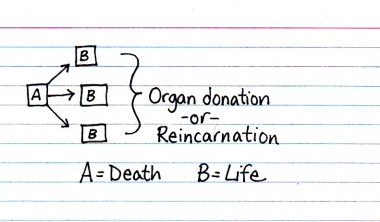One Simple Question
A patient of mine brought her father down to live with her because he was having some problems living alone. She called me in a panic to tell me he was having trouble swallowing, so I rushed over to make a house call (yes, I still make house calls) to see what needed to be done.
It turned out that he'd been having the problem for months. He'd complain (loudly) he couldn't swallow -- yet was able to speak just fine through the episode. Then it would stop as abruptly as it started and he'd be fine, eating and drinking with no problem.
With that history, it was extraordinarily unlikely that there was something seriously wrong organically. Symptoms of an esophageal tumor wouldn't come and go like that. Nothing else really bad came to mind either. Still, it deserved at least a cursory workup, even though the guy was in his 90s. The daughter even told me that she was certain her father had seen the doctor for this problem, although she couldn't remember what testing, if any, he had already had, at his previous doctor's at Geisinger.
As anyone who reads anything about health care economics knows, Geisinger is one of the large multispecialty organizations specifically mentioned as the epitome of efficiency, delivering high quality care with better outcomes at lower costs. These accomplishments are attributed both to the corporate culture of cooperation between specialists and primary care physicians, but also in large measure to the fabulous efficiencies provided by their system-wide electronic medical record system. It should be a fairly simple matter to find out if he had had either a barium swallow and/or an endoscopy to evaluate his swallowing issues. Either of those negative studies would be enough to reassure us that there wasn't anything immediately life-threatening going on.
Piece of cake! The patient signed a release. Three weeks later* I get a half-inch thick sheaf of papers printed out from Geisinger's EMR. I wade through page after page of beautifully documented outpatient visits, complete with nurses notes, medication reconciliation, exam findings; all kinds of crap. Yes, dysphagia (difficulty swallowing) is listed as a diagnosis, but I can't see any record of it having actually been addressed at any visit. I couldn't find any labs, x-rays, other imaging studies, or procedures anywhere in the records.
Hm. Seventy-five pages that didn't say jack.
Then again, there were some notes about a hospitalization. Too bad all it said was, "Hospital follow up visit." Perhaps he had had studies done in the hospital, and those records, although not included in my printout, were easily accessible to someone actually on the system.
So I picked up the phone.
Actually, I had to do it twice. The first time around, my call was dropped somewhere between the voicemail system and any actual liveware. When I called the second time, I tried a different tack. Instead of asking to talk to an actual doctor, I decided to try letting the system do its thing. After all, I just had a very simple question: has this patient had either an upper endoscopy or a barium swallow?
Guess what? She can't tell either. There's nothing written anywhere in Geisinger's much vaunted EMR about the workup of a medical problem this patient has had for the better part of a year.
Riddle me this, boys and girls: what the hell good is a medical record if you can't tell what tests a patient has already had?!? Just by way of comparison, previous studies -- or specific notations about what the patient has NOT had -- are part of my history of present illness (HPI) every time I see a patient for a new problem. Not only that, but because of the way I keep the papers filed in my chart (that's right: still paper), I can put my hands on the report of a barium swallow or endoscopy in about six seconds (and that's only because I have to be careful of sharp paper).
And this is Geisinger; one of the groups identified BY NAME as a model that the rest of us should emulate. Really? When they can't manage to answer one simple question about a patient's care?
I don't think so.
*By comparison, I usually get medical records in the mail the next day; by the end of the week at the latest.













